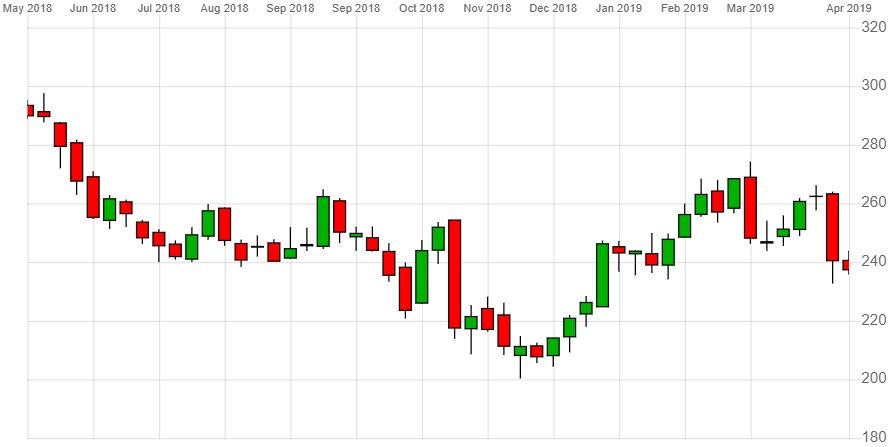RBS share price struggles following earnings and Brexit paralysis
Royal Bank of Scotland [RBS] chief executive Ross McEwan never made a secret of it: Brexit was going to hit margins. “The uncertainty factor … is starting to impact our revenues,” he told the audience at the Morgan Stanley European Financials Conference on 19 March. “If people sit and don't do anything… there’s only so much you can grow, and we're not going to grow outside our risk appetite.” Across the next two days following the event, the bank’s stock fell 8%.
Fast-forward one month, and Q1 results brought few pleasant surprises - other than the fact that attributable profit falling 12.5% to £707m from £792m, was a far more mild drop than a predicted tumble to £546m.
Shares had already been battered on 24 April, the day before results, when McEwan announced he would leave the job within a year, once a successor is found. The stock closed the week ending 26 April down 8.5%. On the earnings call, McEwan and colleagues said the results “reflect the challenging environment we are operating in”, but reiterated the bank would push ahead with its focus since the Kiwi took over: sanitising the books, cutting costs and returning capital to shareholders.
“We remain on track to meet our £300 million cost reduction target this year, achieving a £45 million reduction in the quarter,” the bank said.
“We remain on track to meet our £300 million cost reduction target this year, achieving a £45 million reduction in the quarter” - Chief executive Ross McEwan
UBS analyst Jason Napier noted that although the results would lead to cuts in full-year forecasts, as RBS has warned, “the headline results probably look worse than the reality”.
| Market cap | £28.41bn |
| PE ratio (TTM) | 18.83 |
| EPS (TTM) | 12.50 |
| Quarterly revenue growth (YoY) | -8.50% |
RBS stock vitals, Yahoo finance, 07 May 2019
NatWest Markets
The black sheep this quarter was NatWest Markets (NWM), the ring-fenced division that took on all of RBS’s investment banking activity post-restructuring, which fell more than 40%, meaning the division suffered an operating loss of £62m.
On top of the tough trading environment which has also hit the likes of Goldman Sachs [GS], JPMorgan [JPM] and Barclays [BARC], the results stemmed from a reclassification of legacy debt, which moved from the main RBS entity to NWM, and a change to how interest income on impaired loans is accounted for. The bank said that underlying revenues were down by just 8.5%, which was more in line with competitors across the sector.
“Ring-fencing [and] Brexit probably haven't helped us one iota,” said McEwan, noting that Brexit has also begun to bite on the commercial and investment baking side. It was a fact that McEwan has been warning of for near a year, having reiterated the challenge at the Morgan Stanley conference in March: “You are seeing the larger corporates holding back on investments. And, over time, if we don't get those investments going, that will fall back into other parts of the economy.”
“Ring-fencing [and] Brexit probably haven't helped us one iota” - Chief executive Ross McEwan
It’s why McEwan was defensive of the bank’s performance, despite the losses, calling the earnings a “solid set of results against a highly uncertain background”.
Summarising the results, the bank said in a statement: “While we retain the outlook guidance we provided in the 2018 Annual Results document, we recognise that the ongoing impact of Brexit uncertainty on the economy, and associated delay in business borrowing decisions, is likely to make income growth more challenging in the near term.”
Liquidity
RBS made headlines last February after revealing it set aside hundreds of millions in provisions for Brexit-induced loan impairments. The last earnings call made clear that investors should not expect any less cautious an approach for the foreseeable future: “We will continue to hold excess liquidity until we kind of get through this kind of Brexit uncertainty. It's interesting to see how long that will go,” said CFO Katie Murray – incidentally, one of the executives tipped to replace McEwan.
Still, the board went to lengths to guarantee it was set to reduce the CET1 liquidity ratio from the current 16.2% to 14% by 2021, and eventually to 12%. The default option, as soon as this year, is to return capital as a special dividend. But should that not happen, McEwan said he would look to discuss alternatives with the board (the UK Treasury still owns 62% of the bank).
Disclaimer Past performance is not a reliable indicator of future results.
CMC Markets is an execution-only service provider. The material (whether or not it states any opinions) is for general information purposes only, and does not take into account your personal circumstances or objectives. Nothing in this material is (or should be considered to be) financial, investment or other advice on which reliance should be placed. No opinion given in the material constitutes a recommendation by CMC Markets or the author that any particular investment, security, transaction or investment strategy is suitable for any specific person.
The material has not been prepared in accordance with legal requirements designed to promote the independence of investment research. Although we are not specifically prevented from dealing before providing this material, we do not seek to take advantage of the material prior to its dissemination.
CMC Markets does not endorse or offer opinion on the trading strategies used by the author. Their trading strategies do not guarantee any return and CMC Markets shall not be held responsible for any loss that you may incur, either directly or indirectly, arising from any investment based on any information contained herein.
*Tax treatment depends on individual circumstances and can change or may differ in a jurisdiction other than the UK.
Continue reading for FREE
- Includes free newsletter updates, unsubscribe anytime. Privacy policy





